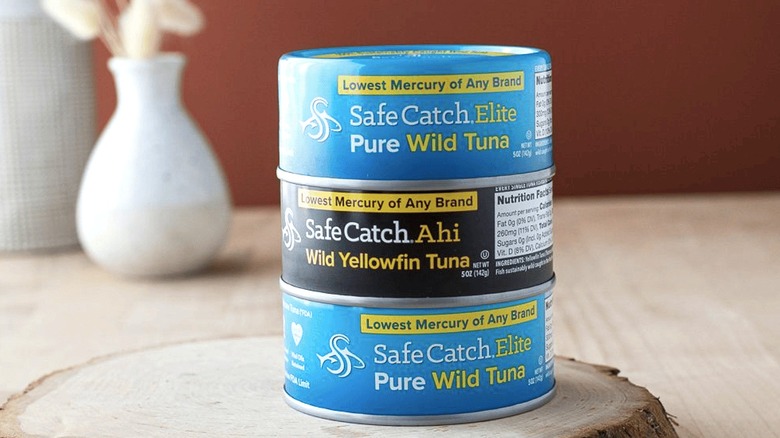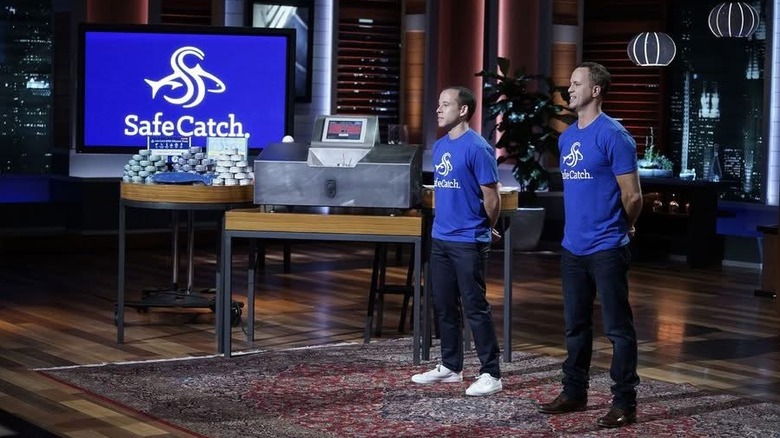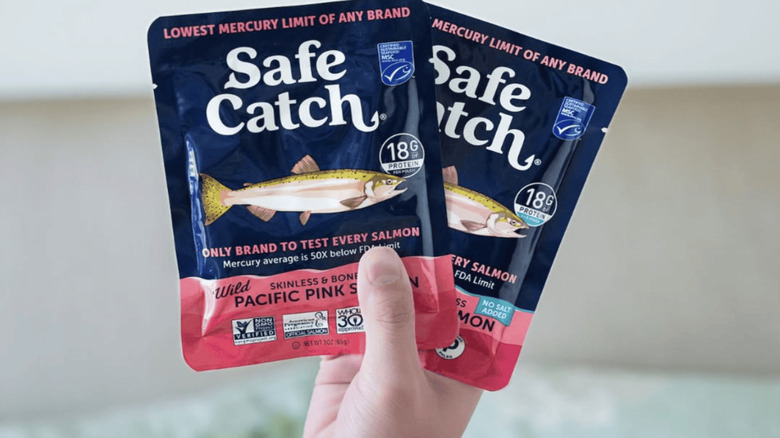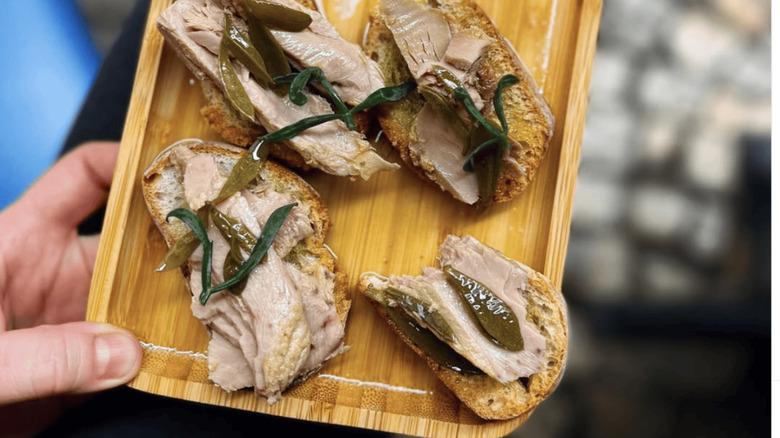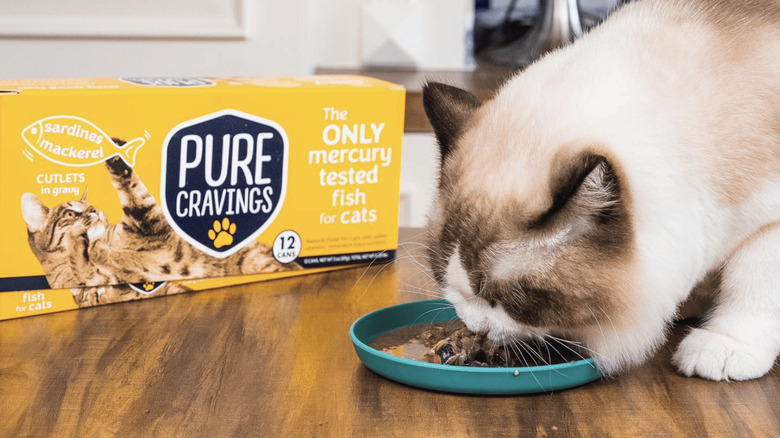Safe Catch: Here's What Happened After Shark Tank
Canned tuna is a delicious protein and omega-3 fatty acid-rich ingredient that you can easily add to any meal, from tuna salad and upscale tuna casserole to eating it straight out of the can. Despite its versatility and wide popularity, concerns about the mercury content in tuna fish and its impact on human health have grown over the past few decades. Two entrepreneurs — Sean Wittenberg and Bryan Boches — took this matter into their own hands by creating Safe Catch, a canned tuna company that sustainably sources and tests each tuna fish for its mercury content before hand-packing it into cans.
The inspiration behind their idea first began when the FDA issued an official consumer advisory about mercury as a neurotoxin in seafood like tuna (a risk you can easily avoid by reading the canned tuna labels). Wittenberg, having grown up eating lots of tuna, began to think about how to solve this issue by testing fish for mercury. Coincidentally, this occurred around the same time that Wittenberg's mother developed mercury poisoning after continuously eating off-the-shelf tuna. This inspired Wittenberg and his father to spend years developing a tuna-testing machine, initially pitching it to large seafood companies. After being turned away repeatedly, Wittenberg and business partner Boches launched their own canned tuna company, Safe Catch. The pair then took their idea to ABC's "Shark Tank" on Season 8, Episode 7, where they showcased their technology by testing a piece of ahi tuna for mercury in front of the panel of investors, or 'Sharks.'
Safe Catch's Shark Tank moment
Sean Wittenberg and Bryan Boches entered "Shark Tank" hoping to gain a valuable investor, seeking $600,000 for a 3% stake in their company. Boches began by telling the sharks that "the average person over the last 10 years is eating 30% less tuna" due to mercury and Wittenberg demonstrated how they test tuna using a modified biopsy needle. While there is still mercury in the tuna, Wittenberg explained on "Shark Tank" that the limit per Safe Catch fish is 0.1 parts per million, which is 10 times stricter than the FDA's regulations. Upon seeing Safe Catch's advanced testing machine and tasting the tuna, the Sharks were immediately impressed with the product.
Nonetheless, when the entrepreneurs began talking about the $14 million they raised (and lost) from previous investors, their $900,000 debt, and the fact they are exponentially losing money, the Sharks began to pull away. In the end, Wittenberg and Boches left without an investor or any money.
The road for Safe Catch after Shark Tank
Despite their experience on Shark Tank in 2016, Sean Wittenberg, Bryan Boches, and the entire Safe Catch team continued to work on their product and grow their business. Their exposure on the show increased sales, and by 2018, Safe Catch received $5 million in seed funding from Echo Capital that helped the company expand its line of tunas, introduce canned salmon, and create paleo, sugar-free seasoned seafood packets. In the same year, Safe Catch launched its products in Kroger and was named as one of the world's most innovative companies for 2018 by Fast Company.
In 2021, however, the company was assessed by the National Advertising Division (NAD) of BBB National Programs, which recommended the company discontinue or modify multiple claims made, such as 'Safe Catch is the only seafood brand to align itself with the mercury standards of the medical community' or the claim the tuna is 'better tasting'.
This speed bump did not stop the company from continuing on its journey towards a safer and more sustainable seafood line, and it partnered with the Marine Stewardship Council in 2022 to ensure only the company uses the most sustainably caught tuna possible.
Where Safe Catch and its founders are today
Safe Catch has experienced both triumphs and obstacles since its creation in 2014, and today is expanding its portfolio by adding more seafood to its lineup and acquiring other seafood businesses. In 2023, Safe Catch added wild-caught mackerel and sardines (the two types of tinned fish that taste the most like their fresh counterparts), and smoked trout in 2024. Safe Catch also recently bought Canadian canned fish company Scout, which offers pre-packaged seafood snacks such as smoked mussels in a paprika and fennel tomato sauce, and Atlantic Canadian lobster. Chief Operating Officer Kevin McCay even announced to New Hope Network that Safe Catch will eventually use its testing technology on Scout's products.
Customers continue to show their love for Safe Catch tuna, with almost 700 5-star reviews on the company's website and a 4.5 rating on Amazon with over 1,200 reviews. Many customers note the flavor and quality of the tuna as their reason for repurchasing the product. The continued success of the company, however, lies in Safe Catch's core mission of helping people have a safer and healthier experience eating canned seafood and making an effort to support sustainable and eco-friendly fishing practices.
What's next for Safe Catch
While no specific next moves have been announced by Safe Catch's executive team, it can be assumed the brand will continue expanding its products and sustainability efforts. All of its products, including its Yellowfin Ahi tuna, Wild Pink Pacific Pink Salmon, Smoked Trout Fillets, Wild Mackerel, and Sardines are available nationwide in the U.S. and Canada, in stores such as Sprouts, Kroger, Walmart, Target, and Costco. Products are also available for online purchase directly through the Safe Catch website. When it comes to sustainability, the company is also furthering its efforts by achieving Plastic Neutral certification by partnering with rePurpose Global in 2021 and donating to ocean conservation groups that help remove plastic from the ocean.
Safe Catch founders Sean Wittenberg and Bryan Boches also entered the pet food space by developing Pure Cravings, a mercury-tested premium cat food brand that launched in 2022. This company has already gained popularity in the past few years, and continues to grow, as it is now available in retail stores such as Pet Food Express.

